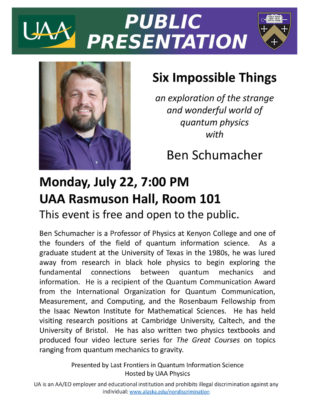July 22, 2019: Explore the strange and wonderful world of quantum physics and quantum computers with two events
by Michelle Saport |
 Join speakers from the Last Frontiers in Quantum Information Science meeting for two free, public events this Monday, July 22. From 3 to 5 p.m. at the UAA Bookstore,
join three Alaska-grown researchers for a discussion of quantum computing. At 7 p.m.
in Rasmuson Hall, Room 101, join pioneering researcher Ben Schumacher for an exploration
of the strange and wonderful world of quantum physics. See below for more details
on both events.
Join speakers from the Last Frontiers in Quantum Information Science meeting for two free, public events this Monday, July 22. From 3 to 5 p.m. at the UAA Bookstore,
join three Alaska-grown researchers for a discussion of quantum computing. At 7 p.m.
in Rasmuson Hall, Room 101, join pioneering researcher Ben Schumacher for an exploration
of the strange and wonderful world of quantum physics. See below for more details
on both events.
Building Quantum Computers Monday, July 22, 3-5 p.m. UAA Campus Bookstore
What is quantum information science? Christina Knapp was born and raised in Anchorage, and graduated from East High School
in 2009. She then went to Williams College in Massachusetts, where she planned to
study English or history, but switched to physics and math after being introduced
to the strange and wonderful world of quantum physics. She is finishing her PhD in
physics this June at the University of California, Santa Barbara, and will move to
Caltech in the fall for a postdoc. Her research focuses on how to use exotic phases
of matter to build a quantum computer that is resilient to noise. Much of her work
is done in collaboration with Microsoft Station Q, a Microsoft research group dedicated
to building what is known as a topological quantum computer.
Gavin Brennen grew up in Fairbanks, Alaska and graduated from UAF with a degree in
physics. He went on to complete a PhD in quantum information at the University of
New Mexico with a thesis proposing one of the first quantum computer architectures
in what is known as an optical lattice. Afterward he worked as a post-doc at the National
Institute of Standards and Technology (NIST) in Gaithersburg, Maryland and a senior
scientist position at the Institute for Quantum Optics and Quantum Information (IQOQI)
in Innsbruck Austria. In 2007, Gavin moved to Macquarie University, Sydney Australia
where he is currently a Professor of Physics and director of the Centre for Quantum
Engineering. His interests range from how to build quantum computers and quantum enhanced
sensors, to simulations of quantum field theory and quantum security for cryptocurrencies.
Robin Blume-Kohout was born on a kitchen table in the Bush, about 25 miles north of
the village of Tanana. After graduating from Fairbanks's Lathrop H.S. in 1994, he
went to Kenyon College in Ohio, where he majored in physics and English, swam competitively,
and graduated in 1998. He earned a Ph.D. in physics from UC-Berkeley in 2005 for research
at Los Alamos National Lab on how decoherence lets classical reality emerge from quantum
physics. After postdoctoral fellowships at Caltech, the Perimeter Institute, and Los
Alamos (again), he joined Sandia National Labs (Albuquerque, NM) as a staff scientist.
Today, Robin is the principal investigator for Sandia's Quantum Performance Laboratory
and an associate research professor at the University of New Mexico. He tries to measure
how well quantum computers work, and why they fail. He lives in upstate New York with
his wife and daughter, commutes a really long way to work, and tries to get back to
his cabin in the Bush at least once a year to saw boards and fix the roof.
Everyone is encouraged to attend. Included in the talks will be the implications of
their current research for the future.
Free parking for this event in the South Lot, West Campus Central Lot and Sports Complex
NW Lot.
Expand/collapse event details
Christina Knapp, Gavin Brennen and Rovin Blume-Kohout, each raised in Alaska, explain
Quantum Information Science and their research challenges. Come learn how three Alaskans
discovered the fascinating world of quantum physics and quantum computers.
Six Impossible Things: An Exploration of the Strange and Wonderful World of Quantum Physics, with Ben Schumacher Monday, July 22, 7 p.m. Rasmuson Hall, Room 101
He is a recipient of the Quantum Communication Award from the International Organization
for Quantum Communication, Measurement and Computing, and the Rosenbaum Fellowship
from the Isaac Newton Institute for Mathematical Sciences.
He has held visiting research positions at Cambridge University, Caltech, and the
University of Bristol. He has also written two physics textbooks and produced four
video lecture series for The Great Courses on topics ranging from quantum mechanics
to gravity.
Free and open to the public, this event is presented by Last Frontiers in Quantum
Information Science and is hosted by UAA Department of Physics and Astronomy.
Expand/collapse event details
Ben Schumacher is a professor of physics at Kenyon College and one of the founders
of the field of quantum information science. As a graduate student at the University
of Texas in the 1980s, he was lured away from research in black hole physics to begin
exploring the fundamental connections between quantum mechanics and information.
 "July 22, 2019: Explore the strange and wonderful world of quantum physics and quantum
computers with two events" is licensed under a Creative Commons Attribution-NonCommercial 4.0 International License.
"July 22, 2019: Explore the strange and wonderful world of quantum physics and quantum
computers with two events" is licensed under a Creative Commons Attribution-NonCommercial 4.0 International License.









